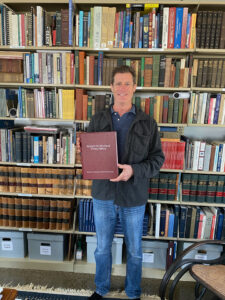School cell phone policy bill supported by local superintendents and state representative

News Photo by Leslianne Johns From front to back, Alpena High School seniors Dixie Wagner and Penelope Malenfant use their cell phones in a classroom on Friday.
ALPENA — A bill that would require a cell phone policy to be enforced at public schools, if passed, is making its way through the Michigan legislature.
House Bill 4141 was introduced to the House on Feb. 26. The policy would require school district boards and boards of public school academies, commonly known as charter schools, to implement a wireless communications device policy that governs device use on school grounds, according to the House Fiscal Agency’s legislative analysis.
Wireless communications devices would be defined as an electronic device capable of text messaging, voice communication, entertainment, navigation, accessing the internet, or producing email.
School grounds would be defined as a building, playing field, or property used for functions and events sponsored by a school, but would not include a building used primarily for adult education or college extension courses, according to the analysis.
For students in kindergarten through fifth grade, a school district would have to create a policy that prohibits wireless communications device possession on school grounds under the bill.
For grades six through eight, school districts would have to prohibit students from using a wireless communications device during instructional time, breaks between instructional time, lunch, and recess, as applicable, according to the analysis.
For students enrolled in grades nine through 12, a district’s policy would have to prohibit students from using a wireless communications device during instructional time.
In addition to the above required limitations, boards could implement additional restrictions regarding the use of a wireless communications device.
“We want our kids off their phones and paying attention in class,” State Rep. Cam Cavitt, R-Cheboygan, said in a statement. “Devices have become a huge distraction and barrier to students receiving a quality education. This plan would enforce some bare minimum restrictions for cell phones in schools, but leaves additional enforcement to local school districts. We want to give locals the ability to make decisions that best suit their district while ensuring cell phones don’t continue to corrode our education system.”
In general, Alpena Public Schools is in support of personal communication devices being put away during instructional time, Superintendent Dave Rabbideau said. APS already has policies in place that are similar to those laid out in the bill.
At Alpena High School, the possession of a cellular telephone, personal computer, camera, or other personal communication device by a student is a privilege, according to the AHS handbook. The handbook states that cell phones and personal communication devices of any kind will not be seen/used in classrooms and house offices without permission. When leaving the classroom during the period, cell phones must be left with the instructor. Phones being used in the hallway while students are transitioning to the restroom will be confiscated.
At Thunder Bay Junior High, the possession of a cellular telephone, camera, or other electronic communication device by a student is a privilege, according to the TBJH handbook. Cell phones in the possession of students are expected to be powered off and not visible while in hallways, bathrooms, and classrooms. Students are allowed to use cell phones during lunchtime in specifically designated areas. In certain situations, teachers may allow students to use these devices to facilitate an educational activity.
At elementary schools in the APS district, the handbook says that all personal electronic devices are prohibited from being used during the school day, which includes iPads, MP3 players, phones, or other handheld music or gaming devices.
At Atlanta Community Schools, students are only allowed to use cell phones before and after school, during class breaks, and during lunch.
Atlanta Superintendent Sue Grulke said that there are charging stations in each classroom. Students can leave their phone on the charger and not become distracted by having it in close proximity.
Grulke said that students will try to go to the bathroom with their phones, but they are disciplined for it. If they are caught, students have their phone taken away for the rest of the day and get it back once school lets out.
Phones are a distraction for kids, Grulke said. Kids don’t interact in person, even if they are standing right next to each other.
Grulke said that she would be happy about a bill passing that requires electronic communication device policies in all public school districts.
Reagan Voetberg can be reached at 989-358-5683 or rvoetberg@TheAlpenaNews.com.




